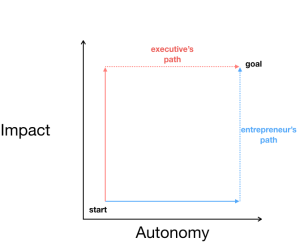This is a simple, imperfect framework that has been helpful to some friends as they think about career decisions. Often when people are unhappy they have made a tradeoff between impact and autonomy that does not match their preferences.

When you are considering a job (or career) you are in the bottom left corner. The goal for many people is maximum impact, maximum autonomy in the top right.
Path 1 is the red line: join a bigger, more established company and have tremendous impact very quickly. As a junior engineer working on Google Search, for example, you can make billions of people’s lives better. You will be tremendously constrained in some ways, however. There are experimentation processes, layers of management to convince, brand risk, and much more. The freedom many people seek comes from many years of delivering results, establishing credibility, and growing inside the organization. This is the executive’s path — you have to work for years inside the organization to earn autonomy and move right on the chart.
Path 2 is the blue line: start a company and have tremendous autonomy. You can hire who you want, work on what you want, and have the final say on many critical decisions. But no one cares. In the grand scheme of things, your work will likely have little impact. To have 1% of the impact of Facebook would make you one of the most successful companies in the world. Having impact requires years of hard work, finding product-market fit, betting on the right market, building an organization that can scale, etc. This is the entrepreneur’s path — you move to the right on the chart immediately and have to work for years to move up.
Succeeding on either path requires very different skills and caters to different personalities. Earning autonomy in a high-impact organization selects for different people than fighting for impact in a sea of startups.
At different times in a career, preferences can shift or it may be worthwhile to pursue time sensitive opportunities. In talking with friends, I’ve noticed that many times if someone is successful but unhappy, they have found themselves on the wrong path. They have traded off autonomy and impact in a way that ultimately was misaligned with their current preferences.
Nice simple visualization. Would be helpful to include a third choice – joining a start-up. Less autonomy but larger impact (depending on stage of startup).
I think I it’s a valid choice for people wanting a different balance of autonomy and impact.
Hope you are enjoying your time off.
Patrick
Love it. Not so much about a right or wrong path, just knowing the cost of the decision to walk either one. The entrepreneurs path can also take a downward arrow to ” no impact” – hence the entrepreneur walks with a bag that carries ” risk”